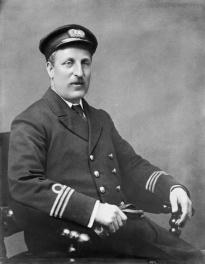Charles V. Skargon (b. 1900): Politics, Protest & Class
The dock strike was still on and to make matters worse, a rail strike began which meant that I couldn’t get back to my sailing port. The dock strike ended but not the rail strike. Then came news of a wireless operators’ dispute which meant that the ships wouldn’t sail without them. So here I was in a cleft stick.
Charles V. Skargon, ‘From Boy to Man the Hard Way’, p. 129.
Skargon was never actively involved in politics at least as far as his memoirs go. However, he certainly felt the repercussions of it, and in From Boy to Man the Hard Way much of the political action going on around him helped steer his life in certain directions. Skargon, to some extent, synonymised such politics with the hand of fate.
The quote above shows an instance which changed Skargon’s fate. The strikes left him without a job to go to out of Liverpool and across the Atlantic and hereafter he never returned to work here. Retreating back to Southampton, Skargon found employ elsewhere on a troopship to Bombay and back. Further strikes after he returned told him that he was not destined to return to Liverpool. In fact, the nature of his work changed too, for he worked as a shopowner aboard the troopship, not a seaman.
The boundaries set up by protest were not seen as a bad omen by Skargon, but rather fate’s way of telling him to move on with his life and break his current trend. Without the strikes, Skargon may never have seen the world to the east or met the woman he would love and marry and settle down and have children with. Politics in Skargon’s world is a catalyst for change, one which he acknowledges and goes along with in the spirit of adventure.
The fact that there were strikes in an area such as Liverpool which relied upon the shipping industry and other industries which employed many working-class workers shows that there was significant political unrest at the time, just after the First World War, particularly between classes. The strike action meant the working-class workers were not getting the treatment and money they deserved. The result was catastrophic paralysis for the area, damaging local industry further.
The war too was an instrument of political power which was an element of fear for Skargon for its entire duration. It had a devastating effect on his family, claiming the life of his uncle, Captain Charles Fryatt as he attempted to ram a U-boat with his vessel. Many of his acquaintances at sea too were lost at sea due to the U-boats and naval mines that lurked in the waters. However, the war too was a catalyst for change, encouraging Skargon to join the Merchant Navy in 1915 and get a qualification in gunnery at Crystal Palace. The politics, though atrocious and bloody, spurred Skargon on to new things which he would not have experienced otherwise.

Charles V. Skargon’, in John Burnett, David Mayall and David Vincent. ‘The Autobiography of the Working Class: An Annotated, Critical Bibliography‘, Brighton: Harvester, 1984, vol. 2, no. 712.
Skargon, Charles V. ‘ From Boy to Man the Hard Way’, Burnett Archive of Working Class Autobiography. University of Brunel Library, Special Collection, 2:712.
Wikipedia. ‘Charles Fryatt.’ [online]
Available at: http://en.wikipedia.org/wiki/Charles_Fryatt
[Accessed 10th January 2015]

Leave a Reply